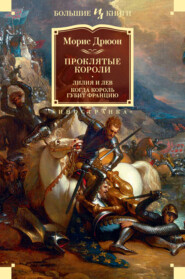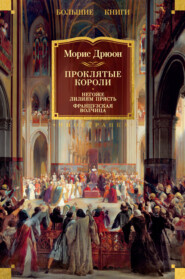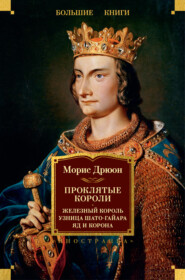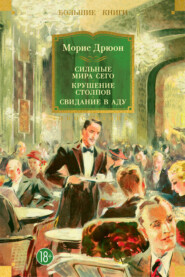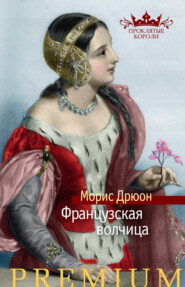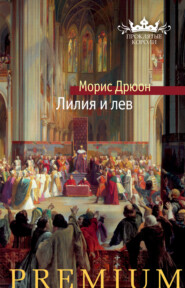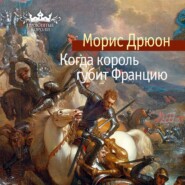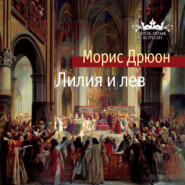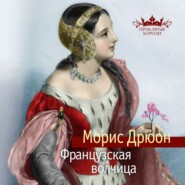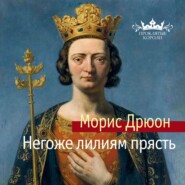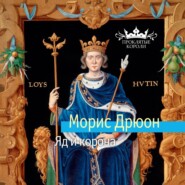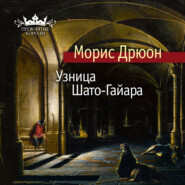По всем вопросам обращайтесь на: info@litportal.ru
(©) 2003-2025.
✖
The Accursed Kings Series Books 1-3: The Iron King, The Strangled Queen, The Poisoned Crown
Автор
Год написания книги
2018
Настройки чтения
Размер шрифта
Высота строк
Поля
Three peasants, who were normally busy in the farmyard, had been called in to wait. They smelt a little of the pigsty and the kennel.
‘Our carver,’ said Dame Eliabel with mingled irony and excuse, indicating the lame man who was cutting slices of bread as thick as logs, upon which they were to eat their meat. ‘I must admit, Messire Baglioni, that he is more accustomed to chopping wood. That explains …’
Guccio ate and drank a lot. The cupbearer was so generous-handed that one might have thought he was watering horses.
The family encouraged Guccio to talk, which was far from difficult. He told the story of the storm in the Channel so well that his hosts let their slices of wild boar fall back into the sauce. He talked of many things, of his experiences, of the state of the roads, of the Templars, of London Bridge, of Italy, of Marigny’s administration. To listen to him, one might have thought that he was an intimate of the Queen of England’s, and he harped so insistently upon the secrecy of his mission that one might well have concluded that war was about to be declared between the two countries. ‘I can say no more than this, because it is a State secret and I am not at liberty to do so.’ When showing-off to other people, it is never difficult to persuade oneself of success, and Guccio now saw things somewhat differently from the morning. He began to think of his journey as wholly successful.
The two Cressay brothers, sound young men but not over-endowed with brains, who had never been more than thirty miles from home, gazed with envy and admiration upon this young man, their junior, who had already done and seen so much.
Dame Eliabel, who was tending to burst out of her dress, and in whom good food awakened appetites unsatisfied in widowhood, allowed herself to look upon the young Tuscan with a certain tenderness; her massive bosom heaved with sensations that surprised even herself and, despite her dislike of Lombards, she could not but be aware of Guccio’s charm, of his curly hair, his brilliantly white teeth, his dark, liquid eyes and even of his foreign accent.
She was assiduous in complimenting him.
‘Beware of flattery,’ Tolomei had often advised his nephew. ‘Flattery is the direst danger that a banker runs. It is very difficult to resist someone who speaks well of one, yet, as far as I am concerned, a thief is better than a flatterer.’
That night Guccio was far from thinking anything of the kind. He drank in every word of praise as if it were hydromel.
Indeed, he was talking particularly at Marie de Cressay. The young girl never took her eyes off him, watching him from beneath beautiful golden eyelashes. She had a way of listening, her lips parted like a ripe pomegranate, which made Guccio want to talk, to talk yet more, and then put his lips for a long moment to that pomegranate.
Distance lends enchantment. For Marie, Guccio was the stranger-prince upon his travels. He was the unexpected, the unhoped-for, the well-known yet impossible being, who knocks suddenly upon the door and is found to have after all a real face, a body and a name.
So much wonderment in Marie de Cressay’s eyes and expression soon caused Guccio to think that she was the most beautiful and attractive girl he had ever seen in the world. Beside her, the Queen of England seemed as cold as a tombstone. ‘If she appeared suitably dressed at court,’ he told himself, ‘she would be the most admired of every woman within a week.’
The meal lasted so long that, when the moment came to rinse their hands, everyone was a little drunk and night had fallen.
Dame Eliabel decided that the young man could not leave at that late hour and invited him to stay the night, however modest the accommodation might be.
‘You will sleep there,’ she said, indicating the large pallet with the curtains upon which six people could have lain with ease. ‘In happier times this was where the guard slept. Nowadays, my sons sleep here. You may share their bed.’
She assured him that his horse had been taken to the stables and well cared for. The life of a knight-errant seemed to Guccio to be continuing. He found it most exhilarating.
Soon Dame Eliabel and her daughter retired into the women’s chamber, and Guccio lay down upon the vast palliasse in the Great Hall with the Cressay brothers. He fell asleep at once, thinking of a mouth like a ripe pomegranate to which he pressed his lips, drinking in all the love in the world.
5 (#ulink_fcec69b1-3995-5b87-8dff-7b91f564ccb8)
The Road to Neauphle (#ulink_fcec69b1-3995-5b87-8dff-7b91f564ccb8)
HE WAS AWAKENED BY a hand pressing gently upon his shoulder. He very nearly took the hand and pressed it to his face. Opening his eyes, he saw above him the smiling face and abundant bosom of Dame Eliabel.
‘I hope you have slept well, Messire.’
It was broad daylight. Guccio, somewhat embarrassed, assured her that he had passed an admirable night and said that he felt in need of an immediate wash.
‘I am ashamed to be seen by you in this state,’ he said.
Dame Eliabel clapped her hands and the lame peasant who, the night before, had served at dinner, appeared, an axe in his hand. Madame de Cressay told him to bring a basin of warm water and towels.
‘In the old days we had a proper bathroom to wash in,’ she said. ‘But it has fallen into ruins. It dates from the time of my late husband’s grandfather, and we have never had sufficient money to repair it. Today we store wood in it. Life, you know, is not easy for us who live in the country.’
‘She is tentatively asking for further credit,’ thought Guccio.
His head felt rather heavy from the wine of the night before, and Dame Eliabel was not precisely the person he would have wished to see upon awakening. He asked where Pierre and Jean de Cressay were: they had gone hunting at dawn. More hesitatingly, he asked after Marie. Dame Eliabel explained that her daughter had had to go to Neauphle, where she had shopping to do.
‘I shall have to go there myself later on,’ Guccio said. ‘Had I known, I could have taken her upon my horse and spared her the fatigue of the road.’
That this suggestion was unrealisable did not appear to cause Dame Eliabel much regret; and Guccio wondered if the Lady of the Manor had not sent the whole of her family away in order to be alone with him. More particularly since Dame Eliabel, when the lame man had brought the basin, spilling in the process at least a quarter of its contents upon the floor, remained in the room, warming towels before the fire. Guccio waited till she should retire.
‘Why don’t you start washing, young Messire?’ she said. ‘Our servants are such dolts that, if left to dry you, they would be certain to scratch you. The least I can do is to look after you. Go on! Don’t mind me: I’m old enough to be your mother.’
Mumbling a thanks he did not feel, Guccio decided to strip to the waist and, taking care not to catch the lady’s eye, sprinkled his head and body with warm water. He was rather thin, as young men are at his age, but was well-built and had a slender waist. ‘It’s just as well that she did not have a tub brought, as I should have had to strip completely under her eyes. These country people have very odd manners.’
When he had finished washing, she came over to him with the warm towels and began drying him. Guccio thought that, if he could leave at once and push on his way at a gallop, he might have a chance of overtaking Marie on the road to Neauphle, or at least of finding her in the town.
‘What a pretty skin you have, Messire,’ said Dame Eliabel in a lively but, nevertheless, somewhat uncertain voice. ‘A woman might well be jealous of such a smooth skin. I suspect there are many who find it attractive. I have no doubt that your lovely olive colouring pleases them.’
While she said this, she was stroking his back, all the length of his vertebrae, with the tips of her fingers. It tickled Guccio, who turned round laughing.
Dame Eliabel looked disturbed, breathless, and there was a peculiar smile upon her face. Guccio quickly put on his shirt.
‘Ah, how wonderful youth is!’ said Dame Eliabel. ‘Only to look at you, I wager you enjoy every moment of it and profit by every opportunity it offers.’
Guccio dressed himself as decently as he could. Madame de Cressay fell silent for a moment and he could hear her breath coming in gasps. Then she said in the same tone of voice, ‘Well, my dear Messire, what are you going to do about our debt?’
‘Here it comes,’ thought Guccio.
‘You can ask us for what you please,’ she went on. ‘You are our benefactor and we bless you. If you want the gold that you made that thief of a Provost give us back, it’s yours, take it away: a hundred pounds if you like. But you have seen our circumstances and you have already shown that you have a heart.’
As she said this, she was watching Guccio buckling his breeches, and it did not seem to him a suitable moment to discuss business.
‘The man who saved us cannot destroy us now,’ she went on. ‘You people who live in towns cannot understand how difficult our life is. If we haven’t yet repaid our debt to the bank, it is because we cannot do so. The government officials thieve from us: you have shown this to be the case. Serfs no longer work as they did in the past. Since the Orders in Council,
the idea of freedom has gone to their heads: one can get nothing out of them these days, and really the clodhoppers are almost on the point of thinking themselves of the same species as you or I. For though you are not noble,’ she said to underline the honour she was doing him by placing him on her side of the divide, ‘you certainly very much deserve to be. If you add the fact that whatever we may harvest one year, bad weather deducts it the next, and that our menfolk spend the little one is able to save at the wars, if they don’t go and get killed into the bargain.’
Guccio, who had but one idea in his head, and that to find Marie, tried to evade the implication.
‘It is not I but my uncle who decides these things,’ he said. But he already knew he was beaten.
‘You can show your uncle that this is no bad investment; I can only wish for his sake that he never has less honest debtors. Give us another year; we will pay you interest. Do this for me! I shall be most grateful to you,’ said Dame Eliabel, seizing his hand.
Then, with a certain modest confusion, which nevertheless did not prevent her gazing into his eyes, she added, ‘Do you know, sweet Messire, that since your arrival yesterday – a woman doubtless should not say these things, but there it is – I have felt a peculiar friendship for you; and there is nothing I would not do to give you pleasure?’
Guccio had not the presence of mind to reply, ‘Well then, pay your debt and I shall be happy.’
From all the evidence it appeared that the widow was prepared to pay in her own person, and one might well have asked if she were submitting to sacrifice to evade the debt, or whether she was merely using the debt as an opportunity of personal sacrifice.
As a good Italian, Guccio thought that it would be extremely pleasing to have both mother and daughter at the same time. Dame Eliabel still had many charms, particularly for those who did not mind a certain fullness of figure, her hands were soft and her bosom, abundant as it might be, seemed nevertheless to preserve a certain firmness; but this could be no more than an additional amusement. To risk missing the younger in order to linger with the older would destroy the enjoyment of the game.
Guccio managed to get away by pretending that he was touched by Dame Eliabel’s advances and by assuring her that he would most certainly arrange the matter; but that, in order to do this, he must go at once to Neauphle and confer there with his clerks.






